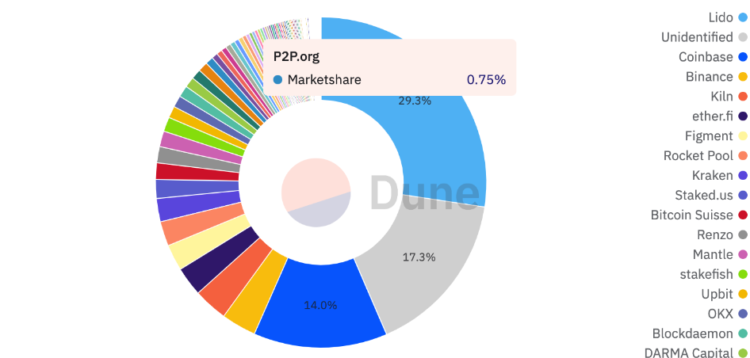The Ethereum blockchain validator P2P.org has reached a new growth milestone of $7.5B in total value locked and is introducing a new SaaB model.

The company informed Cointelegraph on April 10 that the Ethereum validator’s total value locked (TVL) increased from $5 billion in February to over $7.4 billion in March.
P2P.org’s TVL increased by 396% year over year, from $1.4 billion at the end of the first quarter of 2023 to $7.3 billion after Q1 2024.
Dune Analytics data indicates that as of April 8, P2P.org’s market share of all ETH staked amounts to 0.75% or 240,832 units.
By comparison, Lido, the biggest Ethereum validator, holds a 29% stake, or 9.5 million ETH, in the total amount of Ethereum. Dune Analytics estimates that anonymous validators hold up to 17% of the market.

P2P.org announced the development of a new staking model aimed at companies in connection with the TVL milestone. The recently introduced Staking-as-a-Business (SaaB) model seeks to tackle the challenges associated with staking that certain businesses encounter, such as issues with functionality, promoting staking services, and generating money.
P2P.org CEO Alex Esin said, “Our goal is to support the creation or amplification of staked assets within institutional products, ensuring that staking contributes at least 10% to total revenue, ideally reaching 20%.” He continued, saying:
“This is not just a service or a solution; it’s a partnership model that helps businesses to scale by integrating new DeFi and Staking services into their platforms.”
Staking Ethereum involves locking up Ether to keep the network running and paying users with freshly created ETH. The proof-of-stake (PoS) consensus method was accepted by the ETH network in September 2022, marking the introduction of Ethereum’s staking mechanism.
Proof-of-work (PoS) consensus relies on validation rather than mining, in contrast to the latter’s use on the Bitcoin blockchain.
To take part in managing Ethereum’s PoS consensus blockchain, an entity must stake at least 32 ETH in the network. This is known as an Ethereum validator. As of April 9, Beacon Cha data indicates 980,000 validators on the Ethereum blockchain.
